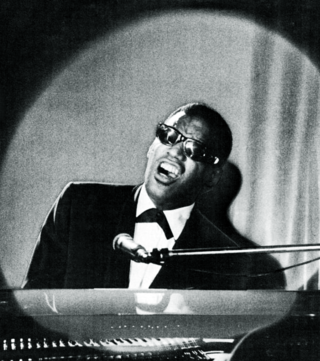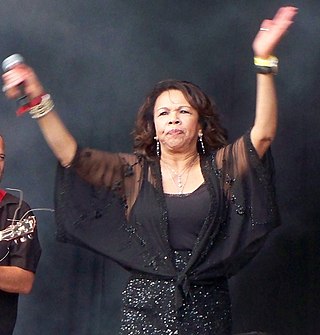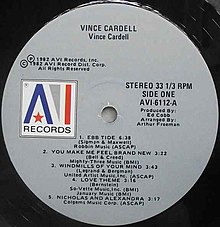
Disco is a genre of dance music and a subculture that emerged in the late 1960s from the United States' urban nightlife scene. Its sound is typified by four-on-the-floor beats, syncopated basslines, string sections, brass and horns, electric piano, synthesizers, and electric rhythm guitars.
House is a genre of electronic dance music characterized by a repetitive four-on-the-floor beat and a typical tempo of 115–130 beats per minute. It was created by DJs and music producers from Chicago's Black gay underground club culture and evolved slowly in the early/mid 1980s as DJs began altering disco songs to give them a more mechanical beat. By early 1988, House became mainstream and supplanted the typical 80s music beat.

Soul music is a popular music genre that originated in the African-American community throughout the United States in the late 1950s and early 1960s. It has its roots in African-American gospel music and rhythm and blues. Soul music became popular for dancing and listening, where U.S. record labels such as Motown, Atlantic and Stax were influential during the Civil Rights Movement. Soul also became popular around the world, directly influencing rock music and the music of Africa. It also had a resurgence in the mid-to late 1990s with the subgenre neo-soul, which added modern production elements and influence from hip-hop.

The Isley Brothers are an American musical group originally from Cincinnati, Ohio, that began as a vocal trio consisting of the brothers O'Kelly Isley Jr., Rudolph Isley and Ronald Isley in the 1950s. With a career spanning over seven decades, the group has enjoyed one of the "longest, most influential, and most diverse careers in the pantheon of popular music".
Motown is an American record label owned by the Universal Music Group. It was founded by Berry Gordy Jr. as Tamla Records on January 12, 1959, and incorporated as Motown Record Corporation on April 14, 1960. Its name, a portmanteau of motor and town, has become a nickname for Detroit, where the label was originally headquartered.

The twelve-inch single is a type of vinyl gramophone record that has wider groove spacing and shorter playing time with a "single" or a few related sound tracks on each surface, compared to LPs which have several songs on each side. It is named for its 12-inch (300 mm) diameter. This allows for louder levels to be cut on the disc by the mastering engineer, which in turn gives a wider dynamic range, and thus better sound quality. This record type is commonly used in disco and dance music genres, where DJs use them to play in clubs. They are played at either 33+1⁄3 or 45 rpm. The conventional 7-inch single usually holds three or four minutes of music at full volume. The 12-inch LP sacrifices volume for extended playing time.
Casablanca Records is an American record label owned by Universal Music Group and operated under Republic Records. Under its founder Neil Bogart, Casablanca was most successful during the disco era of the mid to late 1970s. The label currently focuses on dance and electronic music under the direction of Brett Alperowitz.

"I Heard It Through the Grapevine" is a song written by Norman Whitfield and Barrett Strong for Motown Records in 1966. The first recording of the song to be released was produced by Whitfield for Gladys Knight & the Pips and released as a single in September 1967. It went to number one on the Billboard R&B Singles chart and number two on the Billboard Pop Singles chart and shortly became the biggest selling Motown single up to that time.
Universal Records was a record label owned by Universal Music Group and operated as part of the Universal Motown Republic Group. The label has been dormant since 2006, due to Universal Motown and Universal Republic Records being formed and taking all of the artists from it. Those labels were eventually combined to form the latest iteration of Republic Records.

Ashford & Simpson were an American husband-and-wife songwriting, production, recording duo composed of Nickolas Ashford and Valerie Simpson.

The Undisputed Truth was an American Motown recording act assembled by record producer Norman Whitfield to experiment with his psychedelic soul production techniques. Joe "Pep" Harris served as main lead singer, with Billie Rae Calvin and Brenda Joyce Evans on additional leads and background vocals.

Diana is the eleventh studio album by American R&B singer Diana Ross, released on May 22, 1980, by Motown Records. The album is the best-selling studio album of Ross's career, spawning three international hit singles, including the number-one hit "Upside Down".

Canzetta Maria "Candi" Staton is an American singer–songwriter, best known in the United States for her 1970 cover of Tammy Wynette's "Stand by Your Man" and her 1976 disco chart-topper "Young Hearts Run Free". In Europe, Staton's biggest selling record is the anthemic "You Got the Love" from 1986, released in collaboration with The Source. Staton was inducted into the Christian Music Hall of Fame and is a four-time Grammy Award nominee.
Universal Motown Records was an American record label that operated as a division of Universal Motown Republic Group. It was the contemporary incarnation of the legendary Motown Records label, and the "urban" half of UMG, although there were some rock artists on the label as well.

Linda Clifford is an American R&B, disco and house music singer who scored hits from the 1970s to the 1980s, most notably "If My Friends Could See Me Now", "Bridge over Troubled Water", "Runaway Love" and "Red Light".
Nu-disco is a 21st-century dance music genre associated with a renewed interest in the late 1970s disco, synthesizer-heavy 1980s European dance music styles, and early 1990s electronic dance music. The genre was popular in the early 2000s, and experienced a mild resurgence in the 2010s.

"Forever Came Today" is a 1968 song written and produced by the Motown collective of Holland–Dozier–Holland, and was first made into a hit as a single for Diana Ross & the Supremes in early 1968. A disco version of the song was released as a single seven years later by Motown group the Jackson 5.
The Fantastic Four were a Detroit based soul vocal group, formed in 1965. "Sweet" James Epps, brothers Ralph and Joseph Pruitt, and Wallace "Toby" Childs were the original members. Childs and Ralph Pruitt later departed, and were replaced by Cleveland Horne and Ernest Newsome.

"Heaven Must Have Sent You" is a song written by Brian Holland, Lamont Dozier, and Eddie Holland when at Motown, and first recorded by The Elgins in 1966. It was also a 1979 disco hit single by Bonnie Pointer.
Nashboro Records was an American gospel label principally active in the 1950s and 1960s.












